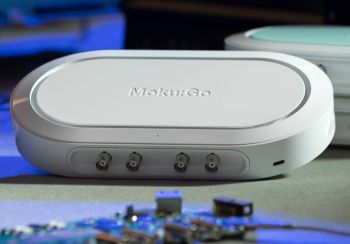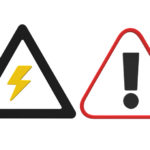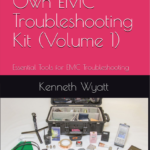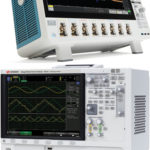Moku:Go is billed as a complete, portable platform designed to bring the engineering lab anywhere and usher in a new era of scientific and engineering education at universities around the world.
Moku:Go is a software-enabled hardware platform that can fit in a backpack. It was designed for  portability, flexibility and durability, to take not just electrical engineering students, but physics, bioengineering, chemical engineering and other majors through all four years of their education and even beyond. It starts with eight instruments including an oscilloscope, PID controller, logic analyzer, arbitrary waveform generator, data logger, spectrum analyzer, and more. It also features full connectivity with a Wi-Fi hotspot and USB-C, robust hardware features and electrical protection to ensure students can explore new projects without putting themselves or their equipment at risk. The unique integrated power supplies are user programmable with high voltage and high current options for any project.
portability, flexibility and durability, to take not just electrical engineering students, but physics, bioengineering, chemical engineering and other majors through all four years of their education and even beyond. It starts with eight instruments including an oscilloscope, PID controller, logic analyzer, arbitrary waveform generator, data logger, spectrum analyzer, and more. It also features full connectivity with a Wi-Fi hotspot and USB-C, robust hardware features and electrical protection to ensure students can explore new projects without putting themselves or their equipment at risk. The unique integrated power supplies are user programmable with high voltage and high current options for any project.
“Our students were thrilled when we first added Moku:Lab to our classroom two years ago, and after seeing the new capabilities of Moku:Go, I’m even more excited. It is clear that it will help take students’ educational experience into the modern era,” said Colonel Brian J. Neff, Electrical & Computer Engineering Dept. Head at the U.S. Air Force Academy. “I look forward to seeing this become a standard part of our curriculum.”
Moku:Go’s software was designed to appeal to a generation accustomed to intuitive user interfaces and broad compatibility. Liquid Instruments is bringing the user experience out of the flip-phone era and has designed intuitive Windows and Mac interfaces that are inviting and powerful for students. It offers remote access capabilities and clearly diagrammed views of the signal processing chain, which makes it easy for students to learn difficult concepts whether they are in person or remote. The student-centric design ensures they are learning the core concepts, rather than just learning the equipment itself.
Not only does Moku:Go help increase student engagement, but incorporation into curriculum also reduces faculty and teaching assistant workloads. The platform supports Python and MATLAB APIs and has published examples of MATLAB live scripts for remote instruction, live student assistance and plagiarism control.
The existing product, Moku:Lab, has been utilized for years by top institutions worldwide, enabling breakthrough research in the areas of photonics, electronics, and materials science. “Our first product, Moku:Lab, gave R&D scientists the power and flexibility they needed to do their job, all in a streamlined and cost-effective platform. Now with Moku:Go we will bring those same advantages to improve the overall quality of education and motivate students to study science and engineering,” said Professor Daniel Shaddock, CEO and co-founder of Liquid Instruments. “Students deserve lab equipment that is powerful and flexible, but also simple and fun to use. Improving access to critical educational tools will empower students from all walks of life to pursue a career in STEM.”
Moku:Go starts at $499 and can be customized to match school colors, with volume purchasing for educational institutions. For information on education discounts, accessories and full specifications, please visit the product page here.
For more information about Liquid Instruments and its full suite of products, please visit https://liquidinstruments.com.






